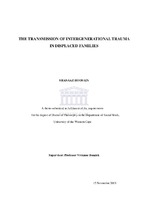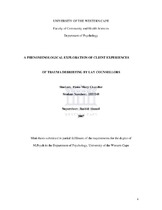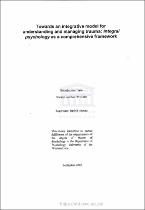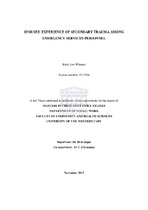The transmission of intergenerational trauma in displaced families
Abstract
This research focuses on the displacement of families in the Western Cape during apartheid within the context of its slave past.The transmission of intergenerational trauma has been based on research on holocaust survivors. Aboriginal academic writers in Australia, New Zealand, Canada and the US found that initial studies of intergenerational trauma did not take into the account the historical trauma of colonialism which they believe has left its mark on aboriginal communities today. In South Africa writers from the Apartheid Archives Project have started to focus on the intergenerational trauma of apartheid. These are mainly academics from psychology and not social work. The Apartheid Archives Project and social work discourse do not focus on the historical trauma of slavery. Historians believe that slavery has still left a mark on its descendants in the Western Cape. The families in this research are descendants of slaves and they were also displaced as a result of the Group Areas Act during apartheid. Qualitative research using a postcolonial indigenous paradigm was adopted in this study. Life histories, semi-structured interviews and focus groups were the primary sources of data collection.
The research design was a multiple case study which consisted of 7 families where each family was a case and 3 generations in each family were interviewed. The families had typical slave surnames and at least one generation was displaced as a result of the forced removals when the Group Areas Act (1950-1985) was implemented during apartheid. Thematic analysis, narrative thematic analysis
and case study analysis was adopted .In addition narrative therapy theory and collective narrative practice was used to decolonise the conceptual framework and methodology. The trauma of displacement and historical trauma of slavery was not acknowledged as traumatic by the dominant society because South African society was based on institutional racism. The grief and loss of the trauma therefore became unresolved and disenfranchised. The findings indicate that disenfranchised grief, silence, socialisation in institutional racism and shame have been the main
mechanisms in which the historical trauma of slavery and trauma of displacement has been transmitted within the families. The effects such as intimate partner violence and substance abuse and community violence in the form of gang violence are forms of internalised oppression which has also been transmitted intergenerationally. In addition overcrowding, poor housing and poverty
has been transmitted via socialisation which is a societal mechanism of trauma transmission. vi The research findings indicate that the trauma of displacement and historical trauma of slavery was transmitted because the trauma was not included in the social discourse of society. In order to prevent the transmission of the historical trauma of slavery and displacement, the real effects of institutional , cultural and interpersonal racism need to be understood and the counter-memories and counter-histories of slaves and their descendants need to be included in social discourse. A framework to assist social workers in engaging with trauma transmission in families has been proposed in order to interrupt the trauma transmission in families.
Collections
Related items
Showing items related by title, author, creator and subject.
-
A phenomenological exploration of client experiences of trauma debriefing by lay counsellors
Chandler, Fiona Mary (2007)South Africa is a country with one of the highest crime rates in the world, resulting in much violence and trauma. Trauma debriefing models are used with groups and individuals in an attempt to facilitate the trauma ... -
Towards an integrative model for understanding and managing trauma: Integral psychology as a comprehensive framework
Train, Belinda Jane (University of the Western Cape, 2002)This is a theoretical study that draws on existing literature to provoke further development in the area of integrative theoretical paradigms of trauma. The main thesis of this study is that an integrative model of trauma, ... -
Spouses’ experience of secondary trauma among emergency services personnel
Wheater, Kerry Lee (University of the Western Cape, 2016)Emergency services personnel are potentially exposed to events involving trauma, suffering and tragedy on a daily basis, which could consequently lead to secondary trauma and post- traumatic stress symptoms. The images and ...




